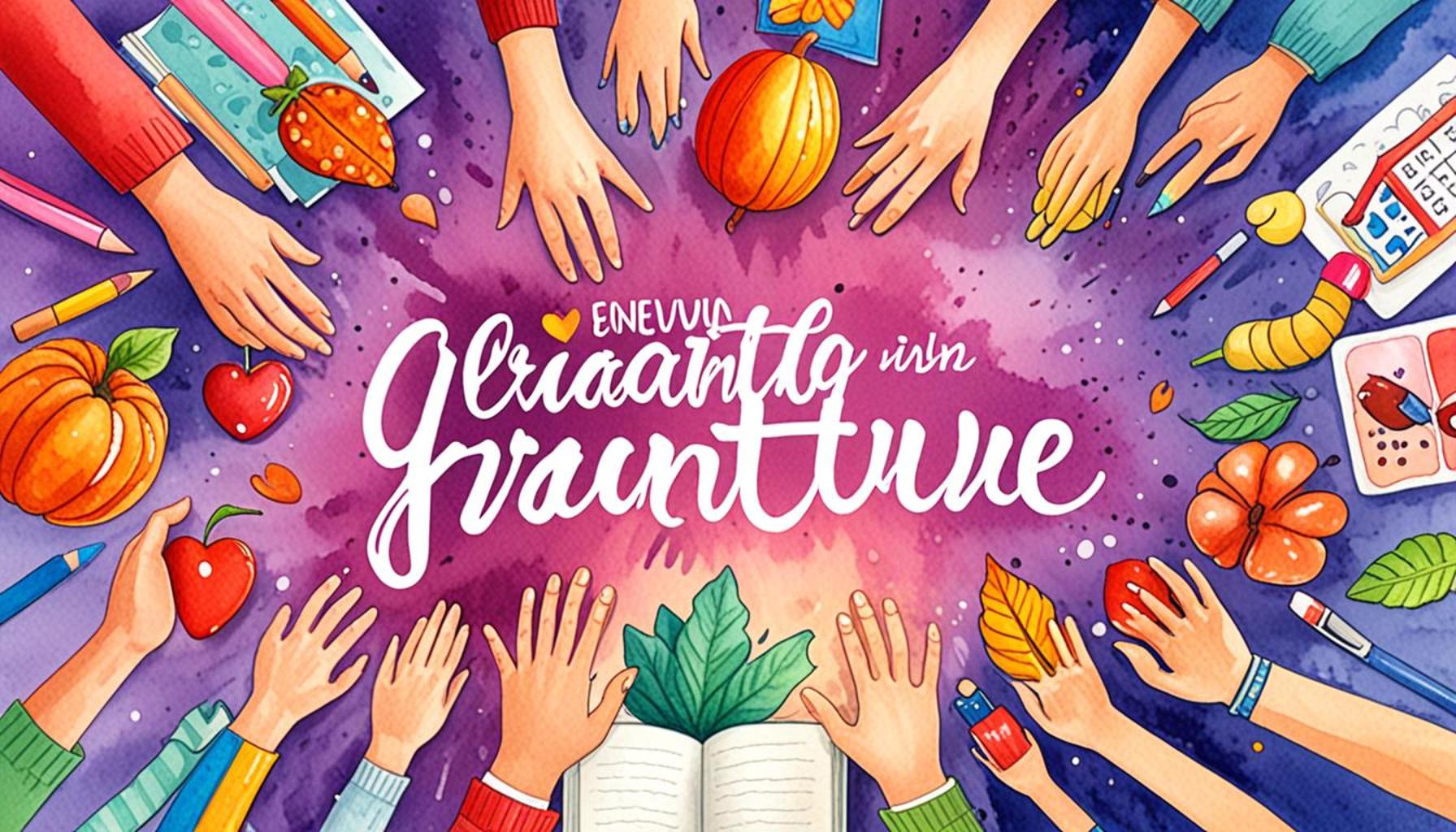The Effect of Gratitude on Interpersonal Relationships: Strengthening Bonds Through Recognition

The Importance of Gratitude in Building Meaningful Connections
Gratitude has emerged as a critical facet in the landscape of interpersonal relationships. It acts as a connective tissue that binds individuals together, fostering camaraderie and mutual respect. Numerous studies have highlighted that when people actively express appreciation for one another, not only do their emotional connections deepen, but the overall dynamics within various types of relationships also improve. This understanding becomes especially significant in vibrant societies like Nigeria, where the essence of communal living hinges upon shared values of respect and appreciation.
Exploring the significant aspects of gratitude can unveil its transformative power:
- Recognition of Efforts: The simplicity of uttering “thank you” can go a long way in encouraging positive behavior. For instance, in a Nigerian workplace setting, acknowledging a colleague’s late-night effort on a project can motivate them to continue performing at their best. Such gestures not only uplift individuals but also enhance productivity and morale among teams.
- Improved Communication: When gratitude is regularly expressed, it opens avenues for more honest and open dialogues. In personal relationships, for example, couples who articulate their appreciation for each other tend to communicate more effectively, leading to a healthier and more resilient partnership.
- Increased Trust: Regular acknowledgment of efforts cultivates an environment of trust. In Nigerian communities, where trust acts as the foundation between neighbors and friends, expressing gratitude can solidify relationships, encouraging individuals to rely on one another, especially in times of need.
The importance of gratitude is particularly evident in Nigeria, where communal and familial bonds are highly valued. Recognizing the contributions of friends and family during festive celebrations or even daily interactions can significantly enhance relationships. For instance, during the festive periods such as Eid or Christmas, expressing thankfulness to those who contribute—be it through food, gifts, or company—can create a sense of belonging and shared joy, reinforcing the social fabric.
Moreover, psychological studies reveal that individuals who practice gratitude not only cultivate a positive outlook on life but also experience greater happiness. This heightened sense of well-being invariably spills over into their relationships, encouraging a cycle of appreciation and warmth. The ripple effect of gratitude can lead to a more harmonious society, where individuals consider and value one another’s contributions.
In conclusion, embracing gratitude is more than just a matter of politeness; it presents a remarkable opportunity to enrich personal and communal relationships. As people in Nigeria continue to navigate a complex blend of traditions and modernity, embedding gratitude into daily interactions can serve as a potent tool for nurturing stronger connections and building a more supportive community.

ADDITIONAL INSIGHTS: Expand your understanding here
Understanding the Dynamics of Gratitude in Relationships
Gratitude functions as a vital ingredient in nurturing interpersonal relationships, weaving a fabric of recognition that enhances emotional intimacy. When individuals take the time to express appreciation, they lay down the groundwork for deeper connections that foster understanding and support. This is particularly relevant in Nigerian society, where relationships often define personal and communal identity. In a world that sometimes feels increasingly disconnected, embracing gratitude can rekindle the warmth of human interaction.
One of the most profound effects of gratitude is its ability to strengthen emotional ties. Research has shown that individuals who frequently express gratitude towards their friends and family tend to have more resilient and satisfying relationships. In practical terms, this could look like a simple thank-you message sent after a friend supports you during a challenging moment. Just this small act can reinforce bonds, reassuring the giver that their efforts are valued and recognized.
Equally important is how gratitude can facilitate conflict resolution, transforming potential disagreements into opportunities for growth. In close-knit communities, such as those prevalent in Nigeria, conflicts can arise over misunderstandings, miscommunications, or cultural differences. However, when gratitude is expressed amidst these tensions, it can help to de-escalate situations. Acknowledging the other person’s efforts—perhaps a family member who made sacrifices to uphold traditions during festive periods—can create a sense of shared purpose, prompting individuals to navigate disputes more amicably.
- Enhanced Empathy: Gratitude allows individuals to empathize better with one another’s situations. In Nigeria, where cultural values often emphasize the collective rather than the individual, seeing the sacrifices made by others can deepen understanding and compassion in relationships.
- Promoting Generosity: An environment saturated with gratitude tends to encourage a culture of giving. When one person feels appreciated, they are more likely to offer help or resources to someone else, creating a ripple effect that extends beyond the immediate relationship.
- Cultivating a Positive Environment: By fostering gratitude in day-to-day interactions, individuals contribute to a more uplifting atmosphere. In a Nigerian context, this can manifest during communal gatherings, where showing appreciation for everyone’s contributions can elevate the overall mood of events.
The transformative power of gratitude extends beyond individual interactions; it enriches social dynamics at large. In a society where communal ties are paramount, embedding gratitude into daily exchanges can serve to elevate relationships, creating a ripple effect that influences an entire community. As Nigerians continue to navigate a tapestry of traditions and modernization, acknowledging the significance of gratitude offers a way to bridge gaps, foster inclusivity, and enhance collective resilience.
As we delve deeper into the essence of gratitude and its multifaceted effects on interpersonal relationships, we’ll uncover practical strategies for incorporating thankfulness into our interactions. It’s time to recognize that gratitude is not just a fleeting moment of appreciation but a fundamental aspect that can significantly transform our connections with one another.
| Category | Key Characteristics |
|---|---|
| Enhanced Communication | Gratitude fosters open dialogue, creating a safe space for sharing feelings. |
| Stronger Emotional Connections | Acts of recognition deepen emotional bonds between individuals. |
| Increased Empathy | Practicing gratitude encourages individuals to consider others’ feelings and perspectives. |
| Conflict Resolution | Gratitude helps in navigating disagreements by emphasizing shared values and respect. |
The theme of gratitude significantly enhances interpersonal relationships by cultivating a culture of appreciation. Communication thrives when people feel recognized and valued. This not only opens avenues for meaningful conversations but also encourages vulnerability. When individuals express their gratitude, they create a safe environment where feelings can be shared more freely.Moreover, gratitude acts as a catalyst for forming stronger emotional connections. Recognizing others strengthens the bonds that tie people together, enriching their relationships. Empathy also blooms in the light of gratitude; it enables individuals to understand and share the feelings of others, fostering deeper connections.In addition, cultivating gratitude can transform conflict resolution. By focusing on what they appreciate in each other, individuals can find common ground, making it easier to overcome differences. This positive approach promotes compromise and fortifies relationship resilience. Gratitude, in essence, is not just a gesture; it serves as a foundational pillar for nurturing robust, lasting interpersonal relationships.
RECOMMENDED: Check out this similar article
Gratitude as a Catalyst for Connection
The multifaceted impact of gratitude goes beyond mere thanks; it fosters a sense of belonging that is essential for nurturing meaningful relationships. In a diverse cultural landscape like Nigeria, where community ties influence daily life significantly, recognizing the contributions of others can serve as a powerful tool for promoting unity and togetherness. This sense of belonging plays a critical role in bolstering a person’s emotional well-being, creating an environment where individuals feel valued and accepted.
One key aspect of gratitude is its role in boosting self-esteem. When individuals express gratitude towards their peers, they not only affirm the efforts of others but also uplift their own sense of worth. For instance, in schools or workplaces, a simple acknowledgment of a colleague’s hard work can lead to enhanced motivation and productivity. Workers who feel valued are more likely to engage proactively, fostering a supportive environment that benefits everyone involved. The relationship dynamic transforms into one of mutual respect and encouragement, which is integral in contexts ranging from classrooms to boardrooms.
Moreover, gratitude can bridge the generational divide, particularly in cultures where elders are held in high regard. Younger Nigerians expressing gratitude to their elders for their wisdom and guidance can create a rich tapestry of mentoring that facilitates knowledge transfer. By valuing the experiences of the older generation, younger individuals not only express respect but also foster a culture of appreciation that can enhance familial bonds. For example, acknowledging the sacrifices grandparents made for their families can lead to deeper emotional connections, reinforcing the idea that gratitude fosters continuity between generations.
- Encouraging Open Communication: An atmosphere of gratitude encourages individuals to express their feelings more freely. This open communication is vital in relationships, as it encourages transparency and trust, allowing for deeper discussions about challenges and joys alike.
- Improving Mental Health: Numerous studies indicate that gratitude can lead to lower levels of stress and anxiety. In Nigeria, where familial support is crucial, demonstrating appreciation can enhance mental well-being, ultimately contributing to healthier relationships.
- Creating Lasting Memories: When gratitude is expressed during significant life moments—such as weddings, birthdays, or other celebrations—it creates lasting positive memories. These shared experiences strengthen emotional ties, making bonds more resilient against life’s challenges.
The role of gratitude in building interpersonal relationships cannot be understated. As individuals engage in habitual expressions of thankfulness, they initiate a ripple effect that improves social cohesion. In communities where social capital is essential, these acts of appreciation can serve as the foundation for collaborative efforts that uplift everyone involved.
By standardizing gratitude as a core value in interactions, individuals create an environment conducive to personal and collective growth. As we further explore this notion, it becomes evident that implementing gratitude can lead to transformative shifts in how relationships function, enabling individuals to forge stronger connections based on recognition and appreciation.
ADDITIONAL INSIGHTS: Expand your understanding here
Conclusion: The Transformative Power of Gratitude
In conclusion, the effect of gratitude on interpersonal relationships can be truly transformative, fostering stronger bonds through the simple act of recognition. By acknowledging the efforts, contributions, and presence of others, individuals can cultivate an environment rich in appreciation, support, and mutual respect. This not only enhances personal connections but also injects vitality into wider social networks within communities across Nigeria.
As we have seen, gratitude serves as a catalyst that promotes open communication and strengthens familial ties, bridging generational divides while leveraging the wisdom of elders. Such practices can significantly uplift the emotional health of individuals, paving the way for healthier relationships that are less fraught with stress and anxiety. Furthermore, shared expressions of gratitude during significant life events forge lasting memories that solidify relational foundations, making them resilient to life’s uncertainties.
These insights emphasize that gratitude should not merely be seen as an occasional response to kindness but as a core principle guiding our interactions. By embedding gratitude into daily life, we can not only enhance our interpersonal relationships but also promote a more cohesive society. As we continue to recognize and appreciate the roles that each individual plays, we contribute to a culture that values connection, ultimately reaping the rewards of improved mental well-being and strengthened interpersonal dynamics.
In a world where relationships often face barriers, embracing gratitude as a key ingredient can catalyze authentic connections and uplift the collective spirit of our communities in Nigeria and beyond.


